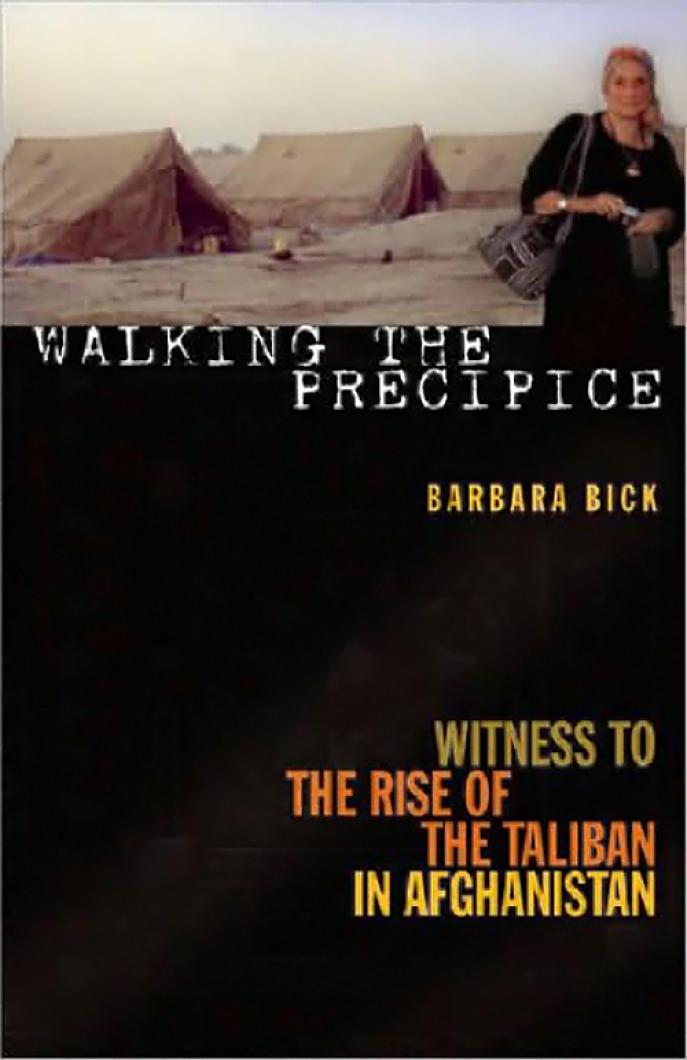Witness to the Rise of the Taliban in Afghanistan, by Barbara Bick, The Feminist Press, $14.99.
History has left us the chronicles of a number of intrepid women of the West who have traversed the Near and Middle East. In this tradition, but surpassing it in many ways, Barbara Bick of Vineyard Haven has written Walking the Precipice: Witness to the Rise of the Taliban in Afghanistan, a testimony for our time. It is a lucid, passionate and at times harrowing political book written on behalf of the women of Afghanistan.
Mrs. Bick, a veteran world traveler, is a lifelong feminist and political activist. In 1990, at the age of 65 and longing for “one last, unforgettable adventure,” she accepted an invitation from the All-Afghanistan Women’s Council to visit that beleaguered country. Two more trips followed in 2001 and 2003.
Unlike embedded journalists, Mrs. Bick traveled independently and her book reflects observations and judgments bound neither by editorial restraints nor the illusion of neutrality. Written in the first person, present tense, the book alternates between vivid immediacy and reflection, always with an unpretentious clarity that makes it accessible to the most uninitiated reader. It also shimmers with self-deprecating humor (especially in scenes at chaotic airports). Along the way the history of Afghanistan, ancient and modern, unfolds as effortlessly as a scroll.
In 1990 after a 10-year occupation, the Soviet Union had been driven out by groups of mujahidin, holy warriors of Islam, funded in no small part by the CIA. To some Afghanis these men were heroes of resistance; to others they were reactionary religious crusaders. In the midst of a mujahidin civil war, the author realizes, “Fear is forging a bond between me and these women and this country.”
In the years following this first trip mujahidin Taliban seized large sections of the country. The women of Afghanistan were thrown into darkness. “For me,” she writes, “the Taliban has come to represent everything I have always fought against.”
Working with an American advocacy group called the Feminist Majority, Mrs. Bick worked to prevent the United States from recognizing the Taliban as the legitimate government of Afghanistan. She singlehandedly confronted their roving ambassador in a scene captured on film in Michael Moore’s documentary Fahrenheit 9/11.
In the late summer of 2001 she returned to Afghanistan with her Afghani-born colleague, Nasrine Gross, who was active in NEGAR (Support of Women in Afghanistan). She wanted to see how women were faring in areas controlled by the Northern Alliance, the only group left opposing the Taliban. Her terrifying experiences during the ominous days surrounding Sept. 11, 2001 are the most dramatic of the book.
She returned for a final visit in 2003 to join 2,000 women at a NEGAR-sponsored conference to build support for incorporating women’s right into the country’s new constitution. She was exhilarated but also saddened by “a sense of how fragile it all is . . . The notion that it is not just Afghanistan, but humanity, that is in crisis casts a shadow over my mind.”
At that time American military objectives had shifted to Iraq, and the ill-conceived and contradictory policies of several U.S. administrations do not escape her notice. She shares the sad irony that while she was often welcomed as a representative of an altruistic and generous government, she was always — as a woman, a feminist, and a leftist — an outsider in her own country.
One unshakable belief informs her perspective: when the position of women is raised, any culture will be profoundly changed for the better. As she writes at the end of her book, “Too slowly, but finally, I hope the world will understand that only when all of humanity’s energy and creativity is released, not just that of one-half of humanity, will we be able to save ourselves.”
It must be very difficult for Barbara Bick, now 82 and in precarious health, to watch the resurgence of the Taliban. Still, readers of her remarkable book will understand that the story of Afghanistan is not over. Indeed, perhaps, it has barely begun.
— Susan Strane
Barbara Bick will speak about her book at the Chilmark public library on March 4 at 5:30 p.m.







Comments
Comment policy »